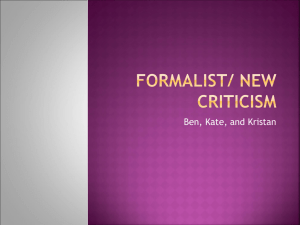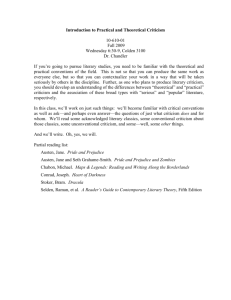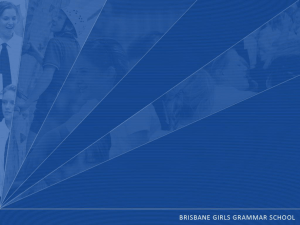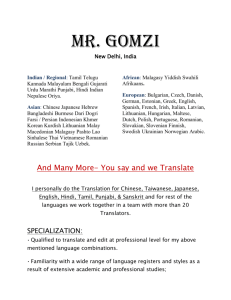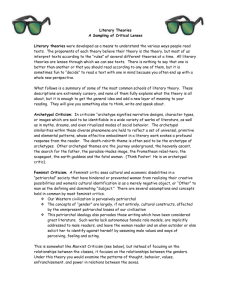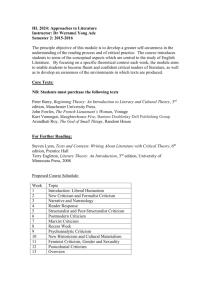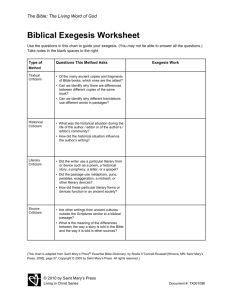This subject aims at introducing the students to - RMP
advertisement
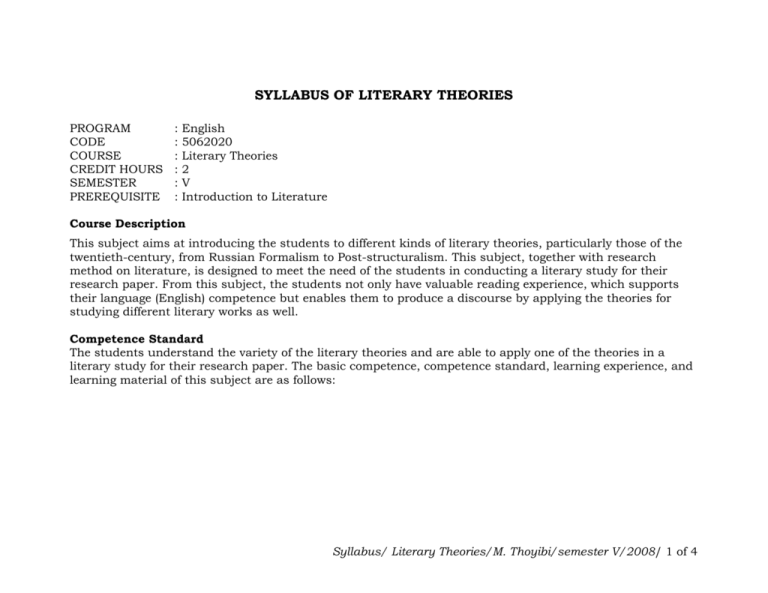
SYLLABUS OF LITERARY THEORIES PROGRAM CODE COURSE CREDIT HOURS SEMESTER PREREQUISITE : : : : : : English 5062020 Literary Theories 2 V Introduction to Literature Course Description This subject aims at introducing the students to different kinds of literary theories, particularly those of the twentieth-century, from Russian Formalism to Post-structuralism. This subject, together with research method on literature, is designed to meet the need of the students in conducting a literary study for their research paper. From this subject, the students not only have valuable reading experience, which supports their language (English) competence but enables them to produce a discourse by applying the theories for studying different literary works as well. Competence Standard The students understand the variety of the literary theories and are able to apply one of the theories in a literary study for their research paper. The basic competence, competence standard, learning experience, and learning material of this subject are as follows: Syllabus/ Literary Theories/M. Thoyibi/semester V/2008/ 1 of 4 BASIC COMPETENCY Students understand the nature and function of literature Students understand the difference of literature from literary study Students understand the notion, principles, and application of different theories/critici sm INDICATORS Having taken this class, the students are able to: 1. explain the nature of literature 2. explain the function of literature 3. construct the definition of literature in a broader sense 4. construct the definition of literature in a narrower sense 5. distinguish literature from other works of art. Having taken this class, the students are able to: 1. explain the nature of literary study 2. explain the variety of literary study 3. distinguish literary theory from literary history and literary criticism Having taken this class, the students are able to: 1. explain the notion of Russian Formalism and New Criticism 2. explain the major principles of Russian Formalism and New criticism 3. identify the similarity between Russian Formalism and new LEARNING EXPERIENCE LEARNING MATERIAL Studying, discussing, and presenting the nature and function of literature Nature and Function of literature Studying, discussing, and presenting the nature of literature and literary study Literature and Literary Study Russian Formalism and New Criticism Studying, discussing, and presenting the notion and major principles of Russian Formalism and New Criticism TIME 100 minutes AID/MEDIA/ SOURCE ASSESSMENT Laptop, LCD, and Slide presentation. “Nature of Literature” and “Function of Literature” (Wellek, 1949: 9-28) Assignment and test 100 minutes Laptop, LCD, and Slide presentation. “Literature and Literary Study,” “Literary Theory, Criticism, and History” (Wellek, 1949: 3-8; 29-37) Assignment and test 200 minutes Laptop, LCD, Slide Presentation Handout Fokkema, D. W. and Elrud Kunne-Bisch. 1977. Theories of Literature in the Twentieth Century: Structuralism, Marxism, Aesthetics of Reception, Semiotics. London: C Hurst & Company, pp. 1049. Hawkes, Terence. 1978. Assignment and test Syllabus/ Literary Theories/M. Thoyibi/semester V/2008/ 2 of 4 4. Criticism apply the principles of Russian Formalism and New Criticism in literary study Structuralism and Semiotics. London: Methuen & Co Ltd. Having taken this class, the students are able to: 1. explain the notion of Stylistics 2. explain the major principles of Stylistics 3. apply the principles of Stylistics in literary study Studying, discussing, and presenting the notion and major principles of Stylistics Stylistics 100 minutes Laptop, LCD, Slide Presentation Handout Bradford, Richard. 1997. Stylistics. London: Routledge. Assignment and test Having taken this class, the students are able to: 1. explain the notion of sociology of literature 2. explain the major principles of sociology of literature 3. apply the principles of sociology of literature in literary study Having taken this class, the students are able to: 1. explain the notion of Marxist Criticism 2. explain the major principles of Marxist Criticism 3. apply the principles of Marxist Criticism in literary study Studying, discussing, and presenting the notion and major principles of sociology of literature Sociology of Literature 200 minutes Laptop, LCD, Slide Presentation Handout Laurenson, Diana and Alan Swingewood. 1972. The Sociology of Literature. London: Paladin. Assignment and test Studying, discussing, and presenting the notion and major principles of Marxist Criticism Marxist Criticism 200 minutes Laptop, LCD, Presentation Slide Handout Fokkema, D. W. and Elrud Kunne-Bisch. 1977. Theories of Literature in the Twentieth Century: Structuralism, Marxism, Aesthetics of Reception, Semiotics. London: C Hurst & Company, pp. 81135. Assignment and test Syllabus/ Literary Theories/M. Thoyibi/semester V/2008/ 3 of 4 Having taken the class, the students are able to: 1. explain the notion of Feminist Criticism 2. explain the major principles of Feminist Criticism 3. apply the principles of Feminist Criticism in literary study Studying, discussing, and presenting the notion and major principles of Feminist Criticism Having taken the class, the students are able to: 1. explain the notion of Psychoanalytic Criticism 2. explain the major principles of Psychoanalytic Criticism 3. apply the principles of Psychoanalytic Criticism in literary study Having taken the class, the students are able to: 1. explain the notion of Existentialist Criticism 2. explain the major principles of Existentialist Criticism 3. apply the principles of Existentialist Criticism in literary study Feminist Criticism 200 minutes Laptop, LCD, Slide Presentation Handout Donovan, Josephine. 1988. Feminist Theory: The Intellectual Traditions of American Feminism. A Frederick Ungar Book New York: Continuum Assignment and test Studying, Psychoanalytic discussing, and Criticism presenting the notion and major principles of Psychoanalytic Criticism 100 minutes Laptop, LCD, Slide Presentation Handout Newton, K. M. 1988. Twentieth-century Literary Theory: A Reader. London: Macmillan. Assignment and test Studying, discussing, and presenting the notion and major principles of Existentialist Criticism 100 minutes Laptop, LCD, Slide Presentation Handout Bigelow, Gordon E. “A Primer of Existentialism” in Alssid, Michael W. and William Kenney. The World of Ideas: Essays for Study. New York: Holt, Rinehart and Winston, Inc. Assignment and test Existentialist Criticism Syllabus/ Literary Theories/M. Thoyibi/semester V/2008/ 4 of 4
